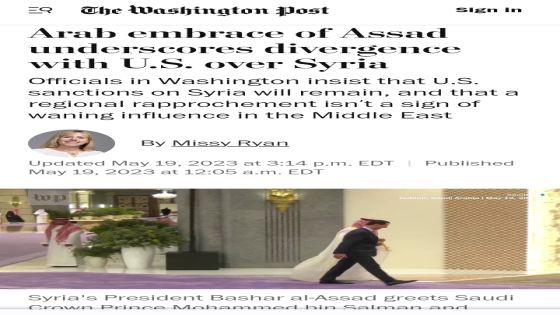By Missy Ryan
Updated May 19, 2023 at 3:14 p.m. EDT|Published May 19, 2023 at 12:05 a.m. EDT
Syria’s President Bashar al-Assad greets Saudi Crown Prince Mohammed bin Salman and Egypt’s Abdel Fattah El-Sisi ahead of the Arab League Summit on May 19.
Middle Eastern leaders welcomed President Bashar al-Assad at a regional summit on Friday, representing a major triumph for the once-shunned Syrian leader as he seeks to shut the door on a decade of bloody civil war.
Are you on Telegram? Subscribe to our channel for the latest updates on Russia’s war in Ukraine.
Syria’s return to the Arab League after an 11-year suspension — another step in the country’s regional reintegration following a prolonged exile over its brutal handling of political uprising — also highlights the stark gap between the United States and some of its closest Middle Eastern partners on an issue that once united them.
The Biden administration, like European allies, has vowed to maintain its policy of isolation and pressure against Assad, whose campaign to crush dissent that began amid the Arab Spring uprisings of 2011 has resulted in the death of hundreds of thousands of people and displacement of half his country’s population.
Saudi Arabia mends ties with Syria as part of regional diplomatic spree
U.S. officials, who spoke on the condition of anonymity to describe sensitive diplomatic discussions, said they have consulted with Middle Eastern leaders about their steps to embrace deeper ties with Syria. They say the Biden administration supports those countries’ overall goals in Syria, including diminishing the influence of shared adversary Iran.
“There has been disagreement on the tactics and sequencing,” one senior official said. “But there is generally alignment on ultimate objectives,” including the understanding that Washington intends to keep tightly in place sanctions that prohibit companies and countries from doing business with Damascus.
Despite early hopes that the rebellion would make way for a more open, democratic Syria, Assad has outlasted scores of his opponents and clawed back territory with the help of economic and military aid from Moscow and Tehran. He now boasts nominal control over nearly two-thirds of the country, according to U.S. estimates, with the remnants of the Islamic State severely diminished.
The rapprochement reflects a recognition in Middle Eastern capitals that, despite earlier efforts to cultivate a formidable opposition to Assad, the U.S.-led policy of replacing the Syrian leader failed, having set the stage for the rise of the Islamic State and the expansion of Iranian military power on NATO’s borders.
But analysts say the disconnect over Syria between Washington and key partners — including Saudi Arabia, Jordan and the United Arab Emirates — also highlights the shifting dynamics in U.S.-Middle Eastern ties, as Arab leaders accuse the United States of neglecting the region in favor of a focus on competition with China and Russia.
Aaron David Miller, a former State Department official now at the Carnegie Endowment for International Peace, said that while the notion of America’s abandonment of the Middle East was overblown — the Pentagon maintains major bases in Bahrain and Qatar, among other places — the growing U.S. focus on “great power competition,” in addition to political upheaval in Washington and increased autonomy in fossil fuels, had the effect of prompting many regional nations to hedge their bets.
“The signals that we have sent in any number of ways compel smaller powers who were dependent on us, who looked to us for support and leverage, to readjust,” he said.
Analysis: Arab leaders keep trying to bury the Arab Spring
The evolving dynamics mirror the challenges President Biden has faced in building support for his campaign to isolate Moscow over the war in Ukraine among major developing nations like Brazil, South Africa and Pakistan, and in the Middle East, as those countries weigh U.S. priorities against China’s expanded clout and Russia’s attempts to court nations frustrated by the West’s liberal democracies.
Arab League summit leaders on Friday, from left, Rashad al-Alimi, head of the Yemeni government’s Presidential Leadership Council, Somali President Hassan Sheikh Mohamud, Tunisian President Kais Saied, Syrian President Bashar al-Assad, Egyptian President Abdel Fatah El-Sisi, Jordanian King Abdullah II, Saudi Crown Prince Mohammed bin Salman, Bahrain’s King Hamad bin Isa al-Khalifa, Qatari Emir Tamim bin Hamad al-Thani, Djibouti President Ismail Omar Guelleh, Mauritanian President Mohamed Ould Abdel Aziz, Palestinian Authority President Mahmoud Abbas and Libyan Presidential Council chief Mohamed al-Manfi. (AFP/Getty Images)
U.S. officials privately concur with many Arab nations’ conclusion that the effort to transform Syria, begun under the Obama administration, yielded little. The United States, along with several Gulf nations, including Saudi Arabia and Qatar, supported initiatives early in the war to train and arm rebels seeking to overthrow Assad. Those lost momentum as larger, more powerful extremist groups gained ground and Russia plunged into the war in 2015, throwing a powerful lifeline to Assad.
Saudi Crown Prince Mohammed bin Salman opened the summit in the Red Sea city of Jiddah saying he hoped Syria’s return would bring stability to the region.
Assad, in his own televised address, lauded what he described as a “historic opportunity to rearrange our affairs with the least amount of foreign interference.”
He said he hoped the summit would represent a new stage of action by Arab states “for solidarity between us, for peace in our region, and for growth and prosperity rather than war and destruction,” he concluded.
Assad’s government has been accused of horrific crimes, including the repeated use of chemical weapons on civilians and frequent targeting of hospitals, schools and other protected sites.
Ukrainian President Volodymyr Zelensky made a surprise appearance at the summit, calling for Middle Eastern support for his country’s campaign to repel the invasion launched by Russian President Vladimir Putin in 2022.
For Assad, Russian military aid has been central in his campaign to bomb opposition areas and cling to power despite the years-long challenge to his rule.
U.S. officials stressed that Syria’s return to the Arab League, an initiative led by Saudi Arabia and the United Arab Emirates, does not constitute a regionwide normalization with the Assad regime but rather a continuation of a trend that began in 2018, when Bahrain and UAE resumed diplomatic relations with Syria. Just this month, Saudi Arabia agreed to reopen its embassy in Damascus.
U.S. officials downplayed the suggestion that Assad’s appearance among fellow leaders in the Arab League, which has limited practical power, represents a transformative moment for the Middle East. They reject the idea that rapprochement with Syria, over U.S. protests, is linked to the perception, widely shared across the Middle East, of a diminished American role in the region.
“This doesn’t mean the rise and fall of U.S. influence,” a second senior official said. “It means different countries, including partners of ours, have evaluated the situation and they’ve decided to take a different approach to get after the problems. That happens in every administration, around the globe, on a variety of issues.”
Officials said they don’t expect Arab nations to test U.S. sanctions, which are designed to prohibit major investment.
Some Arab nations have been less supportive of deepening ties. Qatar, which has feuded with other Gulf states in recent years, said it disagreed with Syria’s re-inclusion in the Arab League but would not pose an “obstacle” to a move backed by regional powers.
U.S. officials say they worked with Arab countries to come up with a list of demands on Assad, but they remain skeptical he will deliver. In addition to checking Iran’s influence and containing Syria’s export of captagon, an illegal stimulant, neighboring countries hope to arrange the return of some of the millions of Syrian refugees whose long stays have strained their economies.
The administration’s commitment to a severe Syria policy was reinforced this month by a bipartisan group of lawmakers, including the chairman of the House Foreign Affairs Committee, Rep. Michael McCaul (R-Tex.), who recently introduced a bill that would strengthen the sanctions and prohibit the U.S. government from recognizing the Assad regime.
William F. Wechsler, a former Pentagon official who heads Middle East programs at the Atlantic Council, said that while the Biden administration had communicated its disapproval of steps to rehabilitate Assad’s tie to Middle Eastern partners, it was also evident that Syria is no longer an American priority.
Arab nations “are accurately judging the U.S. position on normalization, which is the United States doesn’t want to have its fingerprints on it, doesn’t want to support it, but the United States is not going to do anything to prevent it from happening,” he said.
U.S. officials say the growing rapprochement will have little effect on the ongoing U.S. counterinsurgent mission in northeast Syria, where hundreds of U.S. troops remain stationed to prevent the resurgence of the Islamic State. They say Assad’s weakened military is not capable of pressing into those areas, which are controlled by Syrian Kurdish forces.

















